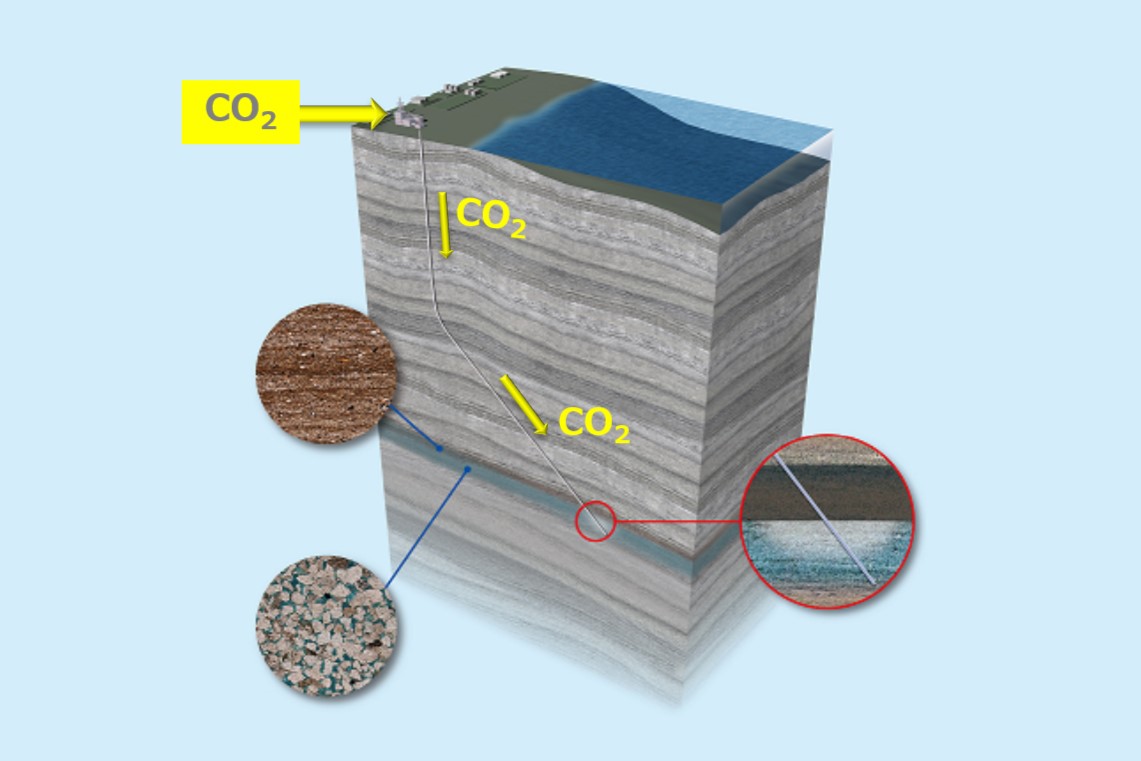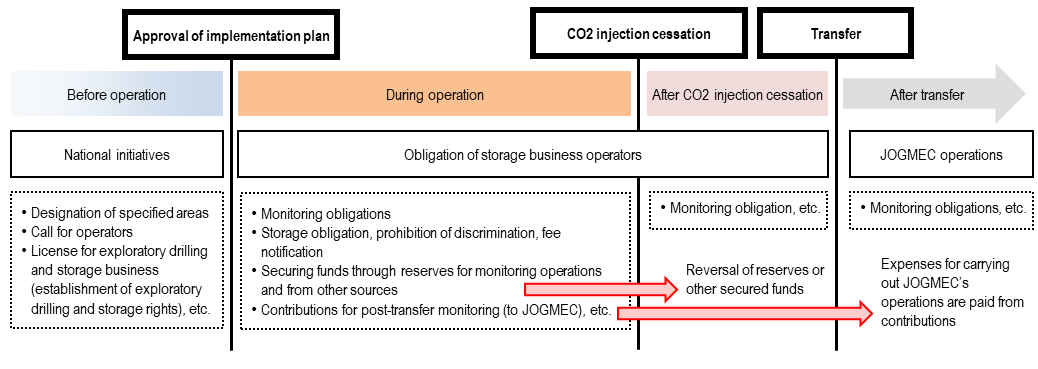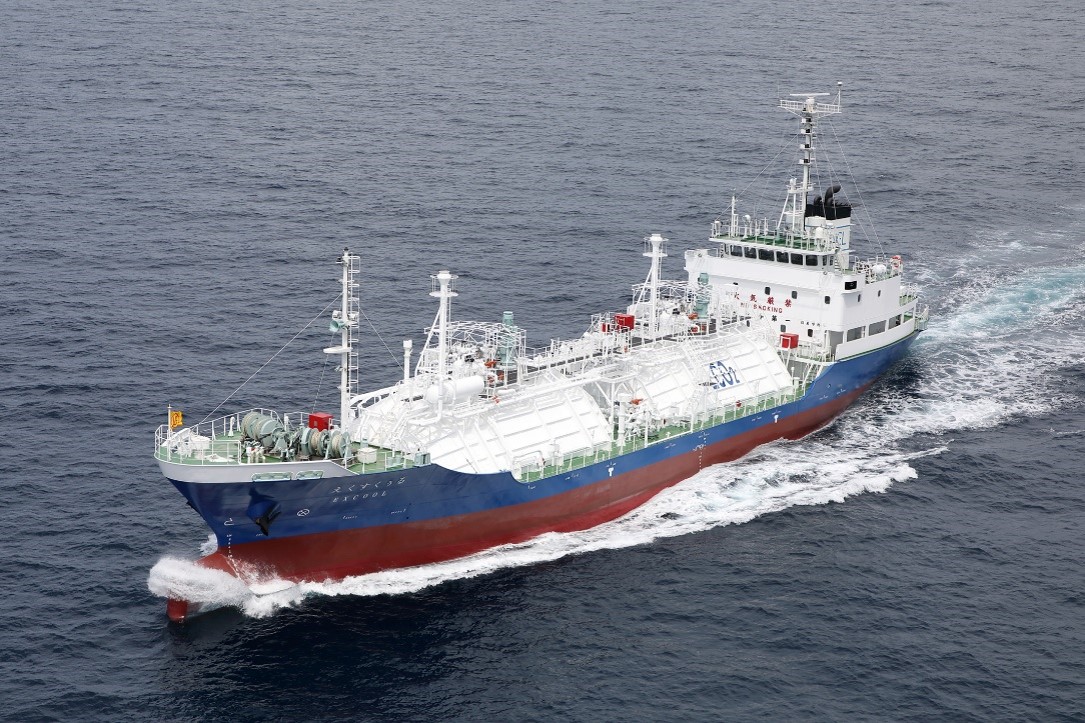CCS Technology (Part 2)
Efforts Accelerating in Japan toward the Commercialization of CCS
What is the CCS Business Act?
(Provisional translation)
(English ver.) 2024-11-08

(Source) Paraphrased from materials made by Japan CCS Co., Ltd.
Part 1 of this article focused on overseas trends toward the commercialization of CCS and explained the support program Japan launched for advanced CCS projects. Part 2 here elaborates on the CCS Business Act (the Act on Carbon Dioxide Storage Business) that was enacted in May 2024. Running business smoothly means ensuring conformity with relevant laws. The CCS Business Act has been established with the aim of ensuring the safe and appropriate operation of CCS. Here’s what you need to know about the Act.
The background against which the CCS Business Act was developed
The commercialization of CCS is positioned as a means of achieving carbon neutrality by 2050. To successfully commercialize CCS, it is essential for the general public to recognize its value and to accept it as business that performs a public good for society. To this end, in addition to industrial promotion and support, it is necessary to ensure appropriate business operation by clarifying the rights and obligations of operators.
As a new business framework, comprehensive rules governing CCS simply did not exist. The CCS Business Act has been established to develop a business environment for CCS. The Act stipulates that CO2 storage business is subject to a licensing system and that CO2 pipeline transportation business is subject to a notification system. It establishes discipline for safe and appropriate CCS operations by stipulating regulations on the business and its security.
Salient features of the CCS Business Act
Main points of the CCS Business Act are described below.
The Act is designed to ensure the safe and appropriate operations of two phases of the business, namely exploratory drilling/storage, and transportation.
1) Safe and appropriate management in the exploratory drilling/storage phase
We designate areas with potential storage reservoirs as “specified areas,” for which a public call will be announced to invite operators to engage in exploratory drilling or storage businesses. The Minister of Economy, Trade and Industry will grant licenses to those evaluated as most capable of conducting them.
With regard to maritime areas, agreement from the Minister of the Environment is required for specified areas to be designated as such or to grant a license for operating a storage business. In the past, CCS projects conducted under the seabed were regulated by the Law relating to the Prevention of Marine Pollution and Maritime Disaster. Going forward, projects in both land and maritime areas will be regulated by the newly enacted CCS Business Act.
During operation, it is an obligation to monitor reservoir temperature and pressure and other parameters, in order to verify whether or not there is leakage of stored CO2 or any other problems. Also, the accumulation of reserves and other financial means are required to secure funds necessary for monitoring and other operations to be conducted after the cessation of CO2 injection.
Flow chart for storage business

If the stored CO2 behaves stably and other requirements are met, the management operations of the storage sites, such as monitoring, can be transferred to the Japan Organization for Metals and Energy Security (JOGMEC). In addition, in order to secure the necessary funds for JOGMEC’s operations after the transfer, storage business operators will be required to pay contributions to JOGMEC.
Furthermore, business operators are required to conform to the technical standards for ensuring safety, notify a construction plan, and establish a safety regulation. To ensure the fairness of business, rejecting storage requests from CO2 emitters without a justifiable reason and discriminating against specific CO2 emitters are prohibited. In addition, it is necessary to provide notification of fees and other matters.
2) Safe and appropriate management in the transportation phase
Operators who transport CO2 by pipeline for the purpose of storing CO2 in a reservoir must notify the METI Minister. Like the exploratory drilling/storage business, operators are required to conform to technical standards and establish safety regulations. It is prohibited to refuse transportation requests by CO2 emitters without a justifiable reason and discriminate against specific CO2 emitters. Also, notification requirements for fees and other matters are imposed.
Demonstration project for maritime transportation of liquefied CO2
Toward the commercialization of CCS, it is expected that large-scale, long-distance transportation will be required in the future. In addition to using pipelines, it is envisaged that maritime transport of liquefied CO2 will be undertaken for large-scale, long-distance transportation from CO2 emission sources to places that are suitable for storage. However, shipping technology allowing such transportation has yet to be developed.
The Liquefied CO2 Shipping Demonstration Project started in FY2021 to address challenges facing shipping technology and demonstrate efficient transportation of CO2. In October 2024, a long-distance transportation experiment was launched with a liquefied CO2 carrier travelling between Tomakomai and Maizuru (about 1,000km). The project aims to establish technology for the stable transport of liquefied CO2 at a low temperature and low pressure by FY2026. If successful, the project will demonstrate the world’s first stable technology for transporting liquefied CO2.
Liquefied CO2 carrier "EXCOOL”

(Source) The New Energy and Industrial Technology Development Organization (NEDO) and Sanyu Kisen Company, Ltd.
The CCS Business Act has been established with the aim of ensuring the stable storage of CO2 and appropriate operation of CCS business. Going forward, we will develop a business environment based on the Act toward the full-scale operation of CCS business by 2030.
Divisions in Charge
About this article
Carbon Management Division, Natural Resources and Fuel Department, ANRE
About the Special Contents
Research and Public Relations Office, Commissioner’s Secretariat, ANRE
![]() The original Japanese text of this article; Click here
The original Japanese text of this article; Click here